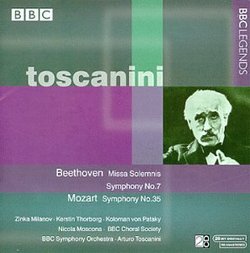| All Artists: Luigi Cherubini, Wolfgang Amadeus Mozart, Ludwig van Beethoven, Arturo Toscanini, BBC Symphony Orchestra, Zinka Milanov, Nicola Moscona, Koloman von Pataky, Kerstin Thorborg Title: Beethoven: Missa Solemnis; Symphony No. 7; Mozart: Symphony No. 35 Members Wishing: 0 Total Copies: 0 Label: BBC Legends Release Date: 10/19/1999 Genre: Classical Styles: Opera & Classical Vocal, Historical Periods, Classical (c.1770-1830), Symphonies Number of Discs: 2 SwapaCD Credits: 2 UPC: 684911401622 |
Search - Luigi Cherubini, Wolfgang Amadeus Mozart, Ludwig van Beethoven :: Beethoven: Missa Solemnis; Symphony No. 7; Mozart: Symphony No. 35
 | Luigi Cherubini, Wolfgang Amadeus Mozart, Ludwig van Beethoven Beethoven: Missa Solemnis; Symphony No. 7; Mozart: Symphony No. 35 Genre: Classical
|
Larger Image |
CD Details |
CD ReviewsA Must Have Reviewer Fantastique | Vernon, CT | 02/07/2009 (5 out of 5 stars) "Before buying this account of the Missa Solemnis, I owned the 1966 account by Klemperer, which impressed me when I bought it and still continues to impress me, but in parts. This recording, on the other hand, impresses me not just in the details, but in its overarching framework. The intensity and beauty that Toscanini gets out of the score, as well as the naturalness of each phrase leading into the next, soon make Klemperer's account of the score, as good as it is, seem not such a great recording of the century. Part of the intensity is due to this being a live recording. Also, for the most part, Toscanini conducts at quicker tempos than Klemperer does (in the Gloria section and parts of the Credo, which can sound a little slow on the Klemperer), though the Kyrie and Agnus Dei sections are conducted slower than Klemperer, which helps to bring out more of the lyricism in these sections. As for beauty, check out how Toscanini blends the string and woodwind parts in the Sanctus. They sound like one glorious instrument. Another part that is beautiful on the Klemperer but angelic on the Toscanini is the Agnus Dei, sung with such feeling on the latter release that it feels like a plea, which it might have been, recorded in 1939, before the second World War would tear the world asunder. The sound quality is remarkable. You are constantly aware that this is not a modern recording (particularly on a trumpet entrance in the Credo that leaps out of your speakers in the Klemperer recording but remains hushed in the background on the Toscanini), but in all, I never missed the better sound on the Klemperer, except during the Benedictus (part of the Sanctus), when I wished Paul Beard's violin solo (on the Toscanini) were less muted and in the background (on the Klemperer, it is in the forefront). Then again, the booklet mentions that Toscanini was worried about "covering the solo violin in the Benedictus," so this may be more a result of it being a live recording and the realities of conducting this piece live than of the age of the recording. Little details that differ from both recordings (like bringing out the timpani part more while the chorus is singing during the Gloria section on the Toscanini) also help to tip the balance in favor of this release over the Klemperer. In addition, I prefer Zinka Milanov (Toscanini) to Elisabeth Soderstrom (Klemperer), though both quartets (and choruses) are excellent. Only those people who want to be able to hear every detail in glorious stereo should pick up the Klemperer first. And if you have the Klemperer version and wonder what the big deal about the Missa Solemnis is, buy this version of Beethoven's masterpiece and you will find out. In addition to the Missa Solemnis, this two-disc set includes a swift and exciting account of Cherubini's Anacreon Overture, a somewhat romantic account of Mozart's 35th Symphony (the "Haffner"), and an excellent account of Beethoven's Seventh Symphony (in much better sound that the classic NYPO recording that took place the following year), all recorded live. Still, it's the Missa that you'll want this set for, and it's that piece that shows why Toscanini was considered the greatest conductor of the twentieth century. Some minor caveats: The lyrics to the Missa Solemnis are not provided, and the Klemperer CD splits the movements into more bands than the Toscanini does, so that the parts of each movement can be accessed separately. In addition, the Missa Solemnis is split between two CDs on the Toscanini, whereas it's contained on one CD for the Klemperer. None of these caveats, however, will spoil your enjoyment of this wonderful two-disc set, which will hopefully show that Toscanini was a much better conductor than many of his NBC Symphony Orchestra recordings would even have you believe." Why Toscanini was so Great Mark Mccollum | 06/19/2009 (5 out of 5 stars) "This is an excellent set of Toscanini performances with the BBC, from an exciting Anacreon overture and a great Missa Solemnis to a nice performance of Mozart's Haffner Symphony No. 35 and one of the greatest recordings ever of Beethoven's Symphony No. 7. As the previous review noted the sound quality is much better than the NYPO recording and is quite amazing for a mid-1935 recording. In regards to Symphony No. 7, I find the tempi better on this performance to be better than the NYPO performance a year later, and it to be a thrilling performance throughout."
|

 Track Listings (10) - Disc #1
Track Listings (10) - Disc #1